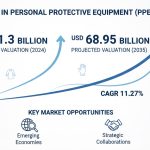Global Whole Genome Synthesis Market
As stated in our extensive report, the Global Whole Genome Synthesis Market accounted for USD 2.4 Billion in 2022 and is projected to reach a value of USD 12.2 Billion by 2030.
The global Whole Genome Synthesis market is expected to experience significant growth in the coming years. Whole Genome Synthesis refers to the process of artificially creating a complete DNA sequence from scratch. This has enormous potential applications in various fields, including biotechnology, medicine, and agriculture. The market for Whole Genome Synthesis is driven by several factors, including advances in gene synthesis technologies, increasing demand for genetically modified organisms (GMOs), and the expanding range of applications for synthetic genomics. With the advancement in technology for synthetic biology, the Whole Genome Synthesis segment is expected to witness an upsurge in market growth.
The increasing demand for artificial DNA sequences for research activities has fueled the growth of the Whole Genome Synthesis market. The ability to customize DNA sequences for research purposes, such as to study the effects of mutations or create designer proteins, has become increasingly important. The field of synthetic biology has also contributed to the growth of the global Whole Genome Synthesis market. Synthetic biology involves designing and constructing new biological systems, including genetic circuits and metabolic pathways. The creation of entirely new organisms requires the ability to synthesize entire genomes de novo, which has increased the demand for Whole Genome Synthesis.
Click To Get a Free Sample On the Research Study

Furthermore, CRISPR-Cas9 gene editing technology has opened up new opportunities for creating synthetic organisms. The ability to precisely edit DNA sequences has made it possible to create new organisms with specific traits that could be useful for various applications. The CRISPR/Cas9 gene-editing technology is anticipated to grow significantly during the forecast period.
However, the high cost of Whole Genome Synthesis has been a major issue. Still, the ongoing advancements in gene synthesis technology will likely reduce the overall cost of synthesizing genes in the future. The development of high-throughput methods for gene synthesis has made it possible to generate large amounts of DNA sequences at a lower cost.
Factors Influencing Global Whole Genome Synthesis Market Growth
The growth of the global Whole Genome Synthesis market can be attributable to the following:
- Increasing demand for personalized and precision medicine: The global Whole Genome Synthesis market is projected to grow due to the increasing demand for personalized and precise medicine. With Whole Genome Synthesis, the complete genetic information of an individual can be obtained, which can be used for personalized treatments. This is expected to drive the market’s growth during the forecast period.
- Technological advancements: The increasing technological advancements in genomics and the development of advanced synthetic biology tools for gene synthesis are expected to drive the growth of the global Whole Genome Synthesis market. Improvements in DNA synthesis techniques and the increasing availability of high-throughput sequencing technologies are expected to boost market growth.
- Rising investments in genomics research: The increasing investments in genomics research by various research organizations and governments worldwide are expected to drive the growth of the global Whole Genome Synthesis market. Government initiatives such as the Precision Medicine Initiative by the US government, which aims to promote genomics research, are expected to boost market growth further.
- Growing applications of Whole Genome Synthesis: The growing applications of Whole Genome Synthesis in various sectors, such as pharmaceuticals, biotechnology, and agriculture, are expected to drive the growth of the market during the forecast period. Whole Genome Synthesis is increasingly used in developing new drugs, gene therapy, and genetic engineering of crops, which is expected to boost market growth further.
- Increasing awareness about genomics: The increasing awareness about the benefits of genomics and its applications in various sectors is expected to drive the growth of the global Whole Genome Synthesis market. With the rising availability of genetic testing services and the growing popularity of direct-to-consumer genetic testing, people are increasingly aware of the importance of genomics, which is expected to propel market growth further.
North America Region to Lead the Market
North America is expected to hold a significant share of the global Whole Genome Synthesis market, owing to a well-established biotechnology and pharmaceutical industry in the region. Moreover, technological advancements in gene synthesis, genome sequencing, and gene editing drive market growth. Furthermore, the Asia-Pacific region is anticipated to grow substantially in the global Whole Genome Synthesis market. The market growth in the region is attributed to the expanding biotechnology industry, increasing government funding, and the rapidly developing healthcare infrastructure. The region is quickly becoming a hub for clinical research and trial activities, driving the market growth for Whole Genome Synthesis.
Conclusion
In conclusion, the global Whole Genome Synthesis market is anticipated to experience significant growth in the coming years, driven by advancements in gene synthesis technologies, increasing demand for genetically modified organisms, and expanding applications of synthetic genomics. The market is expected to grow continuously due to the increasing demand for customized DNA sequences for research purposes and the advent of CRISPR-Cas9 gene editing technology.
The well-known players of the Global Whole Genome Synthesis market include Twist Bioscience (U.S.), Integrated DNA Technologies (U.S.), Thermo Fisher Scientific Inc. (U.S.), Ansa Biotechnologies (U.S.), GenScript Biotech Corporation (U.S.), Eurofins Genomics India Pvt. Ltd. (India), OriGene Technologies Inc. (U.S.) and others.
![[Market Research Reports] – Research Google News Blog | VMR.Biz](https://www.vmr.biz/wp-content/uploads/2022/12/logo-removebg-preview.png)











